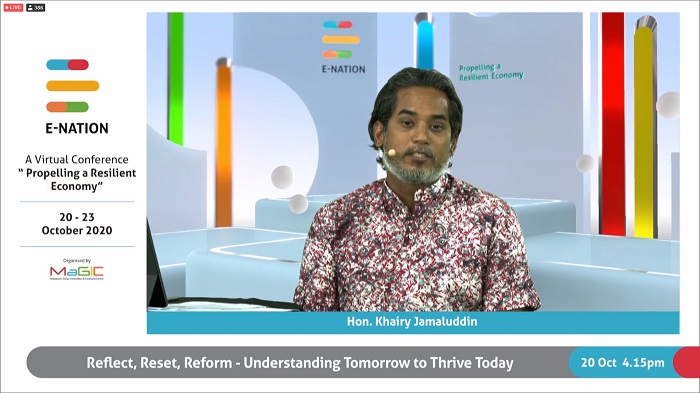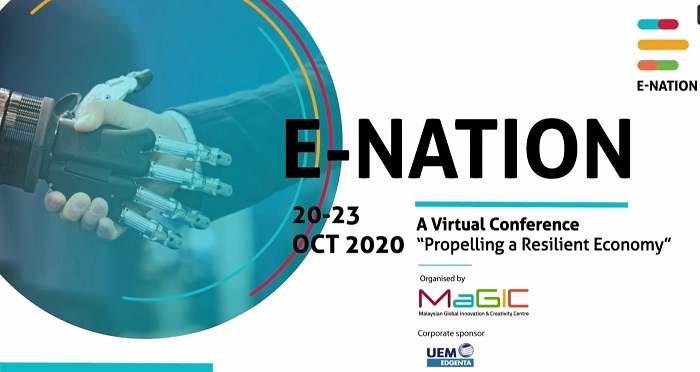E-Nation 2020: Building nations in a post-Covid world requires tech, government, education, and empathy
By Tan Jee Yee October 23, 2020
- Bureaucracy has adapted to the new normal, accelerating change
- A global mindset, empathy important for startups and SMEs going forward

The Covid-19 pandemic may be far from over, but a question we undoubtedly need to ask is this: what’s next? How do we move forward towards building a high-income, high-technology nation without knowing what’s going to happen tomorrow, whether it’s the unforgiving march of technology or a recession that will be hard to overcome?
Malaysian Minister of Science, Technology and Innovation (MOSTI) Khairy Jamaluddin understands the challenge. Speaking in an online panel titled “Reflect, Reset and Reform – Thriving in the New World” at the Malaysian Global Innovation & Creativity Centre (MaGIC)’s E-Nation conference, Khairy notes the extremely difficult challenges in policy-making when the future is so hard to predict.
“Before [the pandemic], there was a trajectory you can anticipate and forecast. Now that’s just gone out of the window,” he says. Yet silver linings exist.
“This crisis presents us with the chance to make changes we should’ve done a long time ago – an opportunity to really accelerate the changes that the government has put off, in term of structural changes to the economy, to corporates, in terms of digitalisation, automation and robotics.”
Malaysia is an example. According to Khairy, the country has moved to make long-term, mission-oriented changes, especially in looking beyond their dependence on cheap, low-level labour in driving manufacturing and the agriculture sector.
“It’s a chance for us to make big investments in robotics and automation, and also looking out for SMEs, where many have resisted investing in digitisation,” Khairy continues. “This is no longer an option; it’s what you have to do to survive.”
The role of education
Khairy was joined by panellists Fleur Pellerin, the founder of Korelya Capital and former France Minister for SMEs, Innovation Digital Economy; Ed Vaisey, former UK Minster of Culture, Communications and Creative Industries; and moderator Richard Quest, International Anchor for CNN. The conversation? How tech, education and business can converge to drive a nation, especially in such rapidly-evolving times.
Pellerin acknowledges the tough spot governments are in now, where they allocated money into helping corporates survive – the short-term priority, as she puts it. The long-term strategic choices governments should make, she feels, isn’t to help big corporations adjust to trends like digitalisation, but rather prepare the next generation. This requires long-term decisions on education.
Education itself is facing its own crossroads during the pandemic. Indonesia’s Minister of Education and Culture, Nadiem Anwar, who began the panel with a pre-recorded message as he wasn’t able to attend the online session, talked about the challenges of adapting to online learning.
“There are infrastructural and adoption challenges here (in Indonesia) … it takes many years to adapt to a new way of learning, but because of the pandemic, we are forced to do so in a much shorter time,” he notes. “But there are a few trends that could be quite positive in the medium to long-term that we haven’t seen before the pandemic.”
What’s unprecedented here, Nadiem, who is better known as the founder of Gojek, says, is the level of tech adoption that is being experimented with in all education levels across the world. “Because students, teachers and parents are experimenting with multiple platforms, I believe this is going to be the beginning of innovation that will enhance the education system in Indonesia and beyond,” he says.
He describes this as a “renaissance for education technology”, and stresses that it’s not just in the realm of remote learning, but on tools that will enhance the capabilities of teachers, parents and students to co-learn and collaborate. “This is the beginning of a very interesting time for education tech which will have a permanent – and positive – impact on education.”
What’s clear from the pandemic, however, is that the next generation will need adaptability in their skillset. For Nadiem, the education system will have to support these key competencies, and do so not just with technology but with more collaborative, project-based learning.
“And refocusing to the love of learning needs to be the core concept of the education system,” he says. “Training the next generation in not just an academic setting, but real-world obstacles and real-world challenges.”
The role of government
But what of bureaucracy and governance? Ed Vaisey says that there is now a massive opportunity for digital government. “It’s long overdue to make your interaction with government as seamless as with an e-commerce provider. If a government is thinking long-term, this is potentially a low-hanging fruit.”
Khairy notes that bureaucracy itself has adapted to the “new normal”, in that what usually takes time to execute, the Malaysian government has discovered could be done quickly. In the upcoming Budget announcement, Khairy says that they are trying to strike a balance between giving health services the required resources to tackle the pandemic, but at the same time think of the future.
“If you don’t do that – to seize the moment and make structural changes that has resisted change, that will be squandering the opportunity,” he says. “It’s not just about lives, but also long-term livelihoods.”
Khairy points to the National Technology and Innovation Sandbox (NTIS) as an example – a way to suspend regulations for innovation to happen in a safe environment. “This is a benefit that has come out of the crisis,” he notes.
There may not be a one-size-fits-all solution here, though Pellerin says that a significant aspect to consider is for policy makers to work with the people who will be impacted by said policies.
“If you try to find the potential collateral damage on the design of a policy, then this helps limit the damaging potential of regulation,” she says. “Having workshops, working groups where you assemble lawyers, companies, startups: it makes your policies much stronger and more efficient.”
She does admit, however, that this is time-consuming, and thus difficult to implement.

The Big Tech concern
Vaisey, on the other hand, says that it’s important to ensure that humanity aspects are not left behind in nation-building. This includes representation across the board. “If you’re not employing people in different backgrounds, you’re only telling one story, and that will spill over into humanity and ethics.”
He points towards how artificial intelligence and facial recognition, if not developed with proper representation, can lead to discrimination and misidentification. “If you’re not looking at diversity in your company, you’re perpetuating the problem that tech is being made by a certain demography, which is then going to spill over into what is currently a theme in tech – the faceless algorithm that makes this cold decisions,” he ruminates.
This leads to concerns surrounding Big Tech – especially on how they have the power to affect smaller tech players from across the world. Pellerin says that are two ways to approach this: defensively, and aggressively.
“The defensive side would be regulations,” she says, but acknowledges the way in which big tech antitrust regulations have not been successful, even in Europe.
The aggressive method, she says, is to foster the tech ecosystem – that is, to help startups in small countries to become regional, and then global. Pellerin’s fund (Korelya Capital) is attempting to establish bridges between Europe and Asia (outside of China) to find synergy in terms of capital, business synergy, development and market access, which helps startups grow stronger against tech giants.
Khairy brings up the difficulty in handling this from the perspective of a middle-sized, middle-income country like Malaysia. “We have to position ourselves as an open economy,” he says. “And we have to ensure our startups can fill the void where they can, to work together with big tech companies.”
This void can be filled with the development of personalised, localised services. “There is an element of nationalism when it comes to using tech. People naturally want to use tech companies that are home-grown,” he says.
At the same time, Khairy states the importance of not being afraid of taking on regulatory issues as well in facing big tech. He says that big tech companies gained and utilise a lot of data from other countries – data which are being monetised, yet these big tech companies do not pay taxes to the countries the data is gleamed from.
“I think there has to be a big conversation at a multi-lateral level on the monetisation that is taking place among big tech companies, and how they are getting away with it,” he suggests.
On talent, and SMEs
Talent is another aspect that gets affected by big tech. Khairy forlornly admits that Malaysia has not branded itself well enough in order to attract and retain talent. “We have to do a lot more,” he says. Incentives can only go so far – marketing, then, is the next step.
Pellerin posits that it’s about how the nation’s startup ecosystem is perceived. In France, the impression given is that the ecosystem is vibrant and full of opportunities. “The younger generation are attracted by salaries, yes, but also the environment – the ability to join interesting businesses. Lifestyle is important. It’s a whole package of things.”
It’s a competition against big tech, which has the money to spend to hire specialists from around the world. Vaisey notes that the UK has taken a different approach, wherein the nation courts the big tech as anchor tenants for the ecosystem, which grounds the talent within the country. But he acknowledges the importance of charm and marketing – and that the government will have to put in the effort.
What should SMEs do at the face of such challenges? Pellerin says that having a global mindset is key. Scaling and going global may be a later stage concern, but a global mindset allows the business to be agile.
And agility is a major differentiator today. As Vaisey puts it, passion and ambition are not enough – companies that weren’t able to switch from one model to another fail fast, something Pellerin concurs.
Khairy agrees, and adds that business models should also have an important aspect: empathy and compassion. He notes that the pandemic affects people very differently, and that tech companies that understands their plights and concerns gives the public more reason to support them.
“Tech companies that speak to this frustration that people are feeling, that brings services that are priced reasonably – that allows people to crowdfund, or P2P models that gives capital to underfunded businesses… these give people a lot more reasons to support your business,” he says.
“Don’t underestimate the value of compassion and empathy in business models going forward. If the pandemic has done anything, it’s to make us more empathetic to one another.”
Related Stories :


